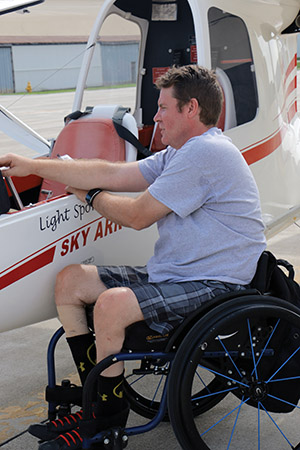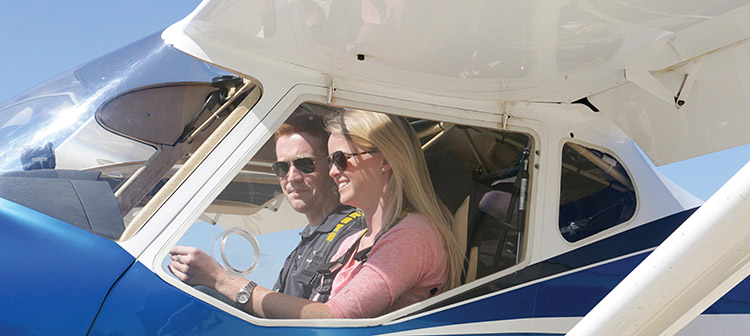In the middle of May, on the first day of her Able Flight experience at Purdue University, Shavon McGlynn experienced her first airplane ride in a cockpit. “I went up with my instructor, and I was overwhelmed. I thought, ‘I don’t think I’m going to get my license.’ He showed me some maneuvers and then asked, ‘Do you want to help me land?’” she says.
McGlynn, who has severe hearing loss, admits she knew nothing about airplanes, flight, or other people who had disabilities different from hers. But a chance 2015 meeting with Purdue graduate student and Able Flight alumnus Wes Major (T’15) led her to explore the possibility of earning her sport pilot license through the Able Flight program. She was one of eight students, the largest Able Flight class yet, to complete the 2016 program at Purdue.
The six-week program, McGlynn says, was challenging. The initial days were focused on studying and practicing. “I knew nothing; I was a newbie. I was learning how everything works. There’s so much to learn and to do,” she says. “Once I started studying, I was able to put it together. With more practice, it became easier; it made more sense. It kind of came together.”
The Able Flight pilots who are in wheelchairs use a specially modified airplane where an instructor sits behind the pilot and gives instructions. McGlynn needed to use an airplane where she could sit next to her instructor so she could read his lips, especially in the louder flight environment. At the same time, she could hear chatter through the plane’s headphones, but she was unable to make out words to be able to follow instructions. The Able Flight team worked with the air traffic control tower personnel to provide light-gun signals during McGlynn’s flights. By the end of six weeks, McGlynn had conquered the material and the skills necessary to earn her sport pilot license.

“Going up solo is probably one memory I will never forget,” she says. “I got to fly for five hours and practice maneuvers.” She received her license along with the rest of the 2016 Able Flight pilots during a special ceremony at the EAA AirVenture Oshkosh at the end of July.
McGlynn is considering pursuing a master’s degree in aviation and aerospace management at Purdue once she graduates from Rochester Institute of Technology next spring. She would be the fourth Able Flight alumnus in seven years to enter Purdue’s aviation program, just like Major, who connected her to the program initially. Major had completed the program as an undergraduate in 2012. The experience was so inspiring, he became a graduate student in the aerospace and aviation management program in the spring of 2013. He has volunteered with the annual training program at Purdue ever since. He will earn his PhD from Purdue in May 2017. “Once you catch the bug, you don’t want to let it go,” he says.

That is one goal of the program — to expand employment opportunities in the aviation industry for persons with disabilities. The self-confidence students gain as part of the program helps them think about career possibilities they otherwise wouldn’t consider. “The whole mission of this program is to create and bolster the self-confidence of the individuals who come to the program. That really happens through solo flight. They have to do everything. After those first couple of solo flights you really see them soar,” Major says. “Hopefully, they really take that to other areas of their life. They represent the disabled community well and show others that things you may not have thought were possible are possible if you push yourself. The pilot certificate is really a bonus at the end.”
Able Flight was founded in 2006 by Charles Stites, who serves as the organization’s executive director. He personally calls all scholarship recipients to let them know they have been accepted into the program. Bernie Wulle, associate professor of aviation technology, has coordinated Purdue’s involvement with Able Flight since 2010. The program caught the eye of aviation entrepreneur Kenn Ricci in 2015. Through the Ricci Family Foundation, he supplied the Purdue Able Flight program with access to a third Sky Arrow L600 sport plane to train even more pilots. That’s one reason the 2016 class is the largest yet. The foundation also supplied scholarship funding for the program. Able Flight scholarships are valued at $8,000 to $10,000. They cover travel to and from Purdue, housing, flight time, instructor fees, use of the aircraft, and fuel.
The scholarship also influenced McGlynn’s career path. “With my bachelor’s degree in business, I can put that together with an aviation degree. I have bigger options for what I want to do in the aviation industry in the future,” she says. “I can’t wait to represent Able Flight and tell people about the program. If they have a dream they want to fulfill, they can make it happen.”

